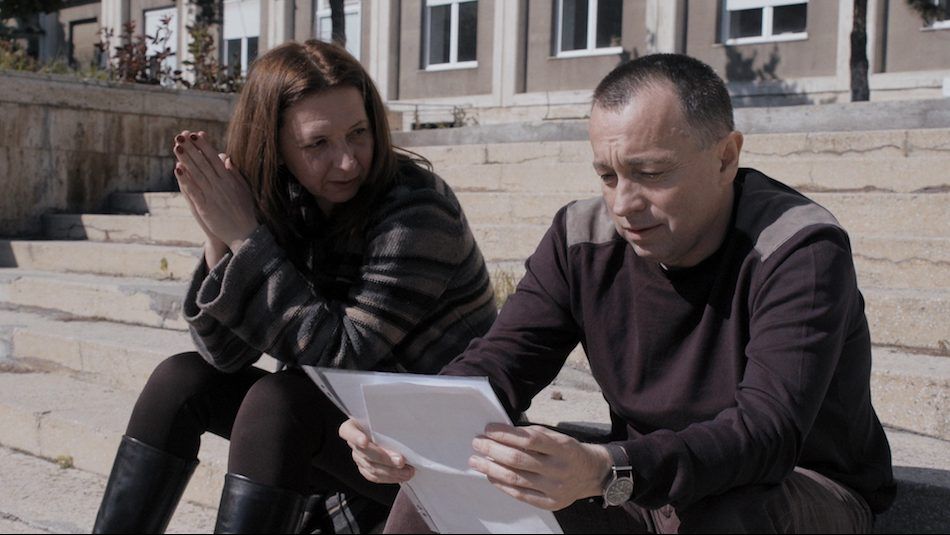
Collective
Recent Releases
There is no resolution in Nanau's documentary on Bucharest's Colectiv nightclub fire, no promise that things will get better in the future.
Miruna Tiberiu
Years before Alexander Nanau’s cameras entered through the doors of Romanian hospitals, my gran made the same trip, a patient amongst millions looking for professional support as she dealt with cancer. What she found, however, was an obstacle course: she manoeuvred her way through hurdles of bribery, fought armies of neglective hospital staff, jumped through hoops of painfully long waiting lists all as part of her quest for basic healthcare.
We thought nothing of it. In Romania, a healthy dose of corruption is to be expected, it has been for almost a century now. But, as Nanau’s piercing documentary shows, corruption isn’t just a nuisance or a bureaucratic hurdle. Corruption kills. His documentary could not have come faster.
On the surface, 'Collective' seems to portray the triumph of the people, headed by their most reliable advocates, journalists, over their corrupt government. A sports gazette unleashes a domino effect of corruption revelations in the Ministry of Health following the Colectiv nightclub fire of 2015. The shakily filmed protest scene, complete with close-up shots of heroic monologues being delivered, precedes the glorious sight of the incompetent Minister of Health’s forced resignation. The force of the people stands uncontested; their sheer outrage seems to squeeze corrupt government officials out of their stronghold of power one after the other. The sight is reminiscent of the televised scenes of the ’89 revolution. ‘Collective’ action worked to push communist dictator Ceausescu out then and it seems to work just as well now. Nanau expertly glides through all echelons of Romanian society to document this revolutionary spirit, his camera treating the cabinet of journalists led by his fierce protagonist Catalin Tolontan with the same level of respect as the young, enthusiastic new Minister of Health Vlad Voiculescu. After the empty feeling of the film’s first act, the audience lets out a sigh of relief. The storm has passed.
And yet, Nanau immediately reminds us that another storm will always hit. The swift move of the camera from Tolontan to Vlad is revealed to be the desperate quest to latch onto a heroic figure in order to blindly kid ourselves that corruption has finally been weeded out. The world, momentarily ravenous for Tolontan and his team’s journalistic voice, eventually moves on. Vlad, for all his good heart, is left dejected, mocked and targeted by other members of government from his first days as Minister. Replacing players in a corrupt game will not change the corruption of the game itself.
Shots of journalist Tolontan’s tour de force attack at the government are replaced by the voices of Social Democrat politicians demanding that ‘Romanian’ hospitals be used to treat the ‘Romanian’ people. The party, seen festering in its own corruption and scandals since the fall of the communist dictatorship in ’89, wins by a historical majority in the 2016 elections. We are left disillusioned on the side-lines. The muffled voice of Vlad’s dad, barely audible as it emerges from his phone, nevertheless reverberates through the screen: ‘move back to Vienna…You’re working in vain’.
And so, the film ends in a lull, and then a crash, reminiscent of the haunting footage of the burning Colectiv club on that night in 2015. In the final moments, we follow the family of one of the victims of corruption as they visit his grave. The sickening silence of the car ride back is pierced as the father puts on Nothing More by The Alternate Routes- his son’s favourite song. The lyrics, a cry for us to ‘be one’, draw back to the title of the film itself, a reminder of the power of collective action shown in the first part of the film. We begin to grasp at the edges of a heart-warming resolution. And yet, Nanau cuts off this uplifting scene, plunging us back into uncertainty. There is no resolution to his film, no timeframe within which there is a promise that things will get better in the future. No one can make such a promise.
However, to me, the ending is far from pessimistic. To be optimistic is not to say that everything is resolved, it is to hope that at some point in the future it will be, and to keep working collectively as a community towards it. ‘A tragedy can happen at any time. It is that simple’, Vlad says to his team. The past year and a half proves this as much as anything. It takes tragedies like these to reveal the deeply entrenched problems in our society. But it is our duty to keep fighting even as we come out of them, to not simply forget and move on until we get hit down again. As a Romanian who, like Nanau, grew up abroad, I was struck by how quick Romanian people were to support each other in 2015. I had never felt the solidarity of the Romanian community until then. Nanau’s documentary proves that, if we can be a collective sometimes, then why not always be a collective? Why not remain assembled, at protests, at polling stations, even in our homes and workplaces? All I can hope is that we remember that the fight is never fully won, even as we come out of this pandemic and back to the lull of normality.